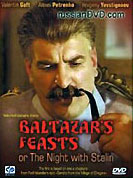Kritiken (3)
Eine fesselnde Sektion der Fatalität der Macht, ein Film, der sich am Rande der Spekulation bewegt, aber mit seinem Bild eines Festmahls der Mächtigen (das seit der Antike so beliebt ist) eine mögliche Interpretation der Persönlichkeit Stalins offenbart. Eine Persönlichkeit, die sich im schizophrenen Würgegriff widersprüchlicher Hälften - Dschugaschwili, der Bauer, und Stalin, der Weltführer - wiederfinden konnte. Und als Koba dem anderen zunickte, befand er sich im Würgegriff der absoluten Macht, die er selbst in Händen hält, die er aber keinen Augenblick loslassen darf. Regisseur Juri Kara porträtiert Stalin als eine seltsame Mischung aus Zerbrechlichkeit, leisem Wahnsinn und Brutalität (die er selbst als existenzielle Notwendigkeit sieht), als einen Manipulator, der mit einem einzigen Wort Männer zu Wracks und Wracks zu Männern macht. Und das Bankett zu seinen Ehren, ein Bankett mitten im Urlaub des Anführers in Abchasien, bietet den idealen Rahmen für ein seltsames satirisch-tragisches Stück, in dem vordergründig nichts passiert, in dem aber in jeder Sekunde das Leben aller auf dem Spiel steht (außer das von Stalin natürlich). The Feasts of Valtasar, or The Night with Stalin ist ein typisches Beispiel für ein unterirdisches Drama, bei dem sich die gesamte Spannung unter den Masken der einzelnen Figuren abspielt, die einen eher karikaturistischen Charakter haben. Seine emotionalen Höhepunkte sind großartig, und die Szene, in der dem Koch das Ei vom Kopf geschossen wird, ist eine der besten Darstellungen von Macht und Demütigung, die ich je in einem Film gesehen habe. Es ist erstaunlich, wie wenig Mittel Kara reichen, um seine Sicht auf die Person des verfluchten und verehrten Anführers zu verdeutlichen, um vor dem Betrachter seine Vision des kommunistischen Apparats zu entfalten, dessen negativster Punkt nicht der überraschend charismatische Stalin, sondern das kriecherische und rückgratlose Schwein Beria ist. Der erzählerische Aspekt des Films hat mich etwas verwirrt, denn er erscheint als "Erinnerung" eines der Teilnehmer am Bankett, zerfällt aber im Laufe des Films in eine typisch russische Polyphonie der Perspektiven. Und die stärkste Motivation für den fünften Stern sehe ich in der unglaublich überzeugenden Leistung von Alexej Petrenko in der Titelrolle...
()
Many things could be written given the authors' excellent work with one feast and a few flashbacks: about the paradox that allowed the first socialist country (the most progressive of the era) to revive ancient Byzantine patrimonial practices in only 20 years of existence, practices in which the ruler is the sun – illuminating all with their greatness and to whom all the nation's views and hopes return. Or about how a Georgian terrorist became the ruler of Russia, etc… As a filmmaker and artistic paradox (but let’s be thankful for it), it personally seems to me that, given the mastery of the film's authors and the book source material, the character of Stalin transcends a simple Manichean division of absolute good and evil, day and night. The cruelty remains, but the ambiguity of his gestures, as well as the almost moving (fictionalized, of course) confession and testimony of Stalin's power, make this cruelty believable because it is human. That is because a human is always more of an enigma than an embodiment of a principle (be it evil or something else). The authors managed to create a very grateful paradox for the audience – they faithfully showed Stalin's worst sides but made him into a human being. The exact opposite is achieved in movies like The Fall of Berlin, and so on.
()
From all the perestroika films I had the opportunity to see, Baltazar's Feast, perhaps with the exception of the satirical City of Zero, impressed me the most. It is far more chilling and raw than the much more famous Abuladze's Repentance. After all, the five years that separate both films broke the ice and allowed us to call things by their real names. To truly appreciate this cinematic experience, it is better to be familiar with the historical realities of the Soviet Union and Georgia as the birthplace of Stalin and his closest collaborator Beria, as the film, or rather the literary source, deals with real names and historical events. The film is a perfect example of political will and an analysis of how dictatorships are born and function. Meticulous direction, strong acting performances, and a quality script - what more could one ask for? Overall impression: 95%.
()

Werbung